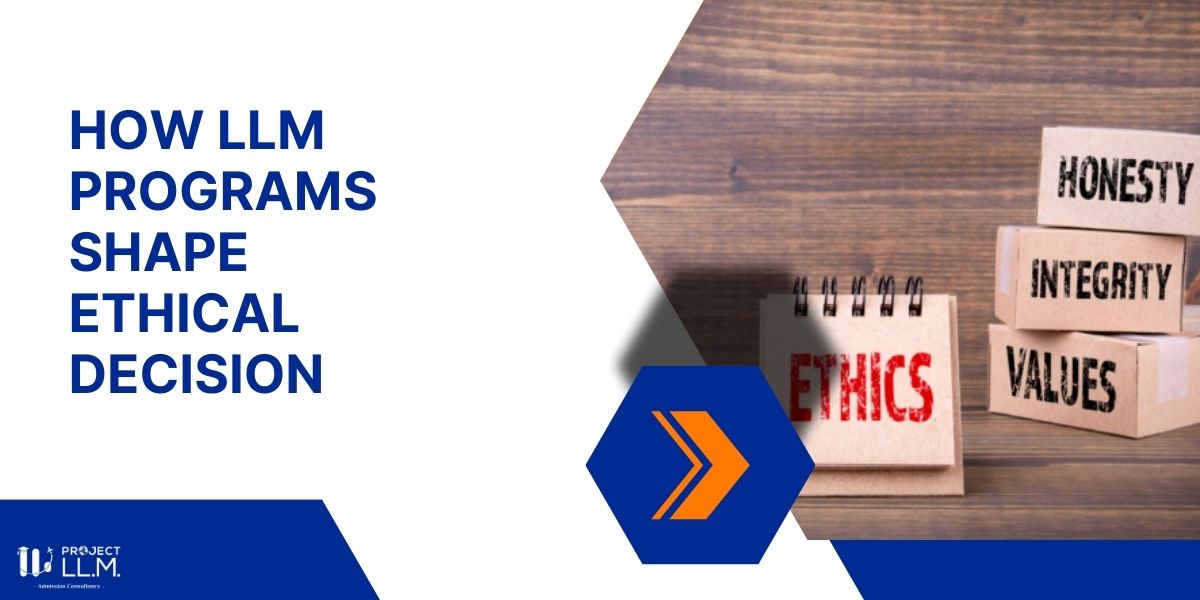In an increasingly interconnected world, legal professionals are faced with a multitude of ethical challenges that span national borders and cultural norms. Global ethics in law play a critical role in shaping how legal practitioners navigate their responsibilities to clients, the public, and the law itself. This article explores the importance of ethical decision-making in the legal profession and examines how pursuing an LLM (Master of Laws) can help students understand and address complex ethical dilemmas faced by lawyers worldwide.

The Importance of Global Ethics in Law
Legal ethics form the foundation of trust and integrity in the legal system. In a globalized world, the profession must adapt to a variety of ethical standards that reflect the cultural, political, and economic differences of various jurisdictions. Ethical decision-making is not just a matter of following rules—it involves a deep understanding of moral principles that govern conduct within the profession.
Defining Legal Ethics
Legal ethics encompass the rules, standards, and principles that guide the behavior of legal practitioners. They address the professional responsibilities of lawyers, including:
- Client Confidentiality: Protecting sensitive information shared between lawyer and client.
- Conflict of Interest: Avoiding situations where a lawyer’s impartiality could be compromised.
- Duty to the Court: Upholding the integrity of the judicial process by adhering to legal standards and providing honest, clear legal arguments.
- Advocacy and Fairness: Ensuring fair representation and respect for due process rights.
As legal professionals engage with clients from different jurisdictions, they must navigate these principles in accordance with the global legal landscape.
The Role of LLM Programs in Ethical Awareness
LLM programs provide an invaluable opportunity for legal professionals to deepen their understanding of global ethics. These programs offer specialized courses that address the ethical challenges faced by lawyers across borders, helping students develop the skills and knowledge necessary to make ethically sound decisions in their practice.
Specialized Courses in Legal Ethics
LLM programs frequently offer specialized courses in international legal ethics, which explore the intersection of law, morality, and global norms. These courses focus on issues such as:
- Cross-Border Legal Practice: How legal practitioners must consider ethical concerns when working with clients in different countries or jurisdictions.
- Human Rights and Ethical Dilemmas: Addressing ethical issues in areas such as refugee law, international humanitarian law, and human rights advocacy.
- Corruption and Legal Ethics: Understanding the ethical implications of dealing with corruption, bribery, and misconduct in legal systems worldwide.
- Corporate Governance and Compliance: Navigating the ethical complexities of corporate law, including conflicts of interest and accountability.
These courses are designed to help students critically analyze ethical dilemmas, build a strong ethical foundation, and develop strategies for addressing challenges that arise in practice.
Exposure to International Legal Standards
LLM students also gain exposure to various international codes of ethics and legal standards, such as the UN Basic Principles on the Role of Lawyers and the International Bar Association’s (IBA) International Principles on Conduct for the Legal Profession. Learning about these frameworks enables students to appreciate the nuances of ethical practice across different legal systems and provides a comparative approach to ethical issues.
Ethical Challenges in Global Legal Practice
Legal professionals who work internationally often encounter complex ethical dilemmas that require careful consideration and thoughtful decision-making. Here are some key ethical challenges lawyers may face:
Conflicts of Law
When legal practitioners work in multiple jurisdictions, they may face conflicting legal and ethical standards. For example, what is considered ethically acceptable in one country may not be permissible in another. Navigating these conflicts requires a deep understanding of the local ethical rules and the ability to find ethical solutions that respect both legal systems.
Client Representation and Integrity
Lawyers often represent clients who are involved in international business or human rights cases, where they may encounter ethical issues such as:
- Conflicting Interests: Balancing multiple clients’ interests without compromising the lawyer’s duty to each.
- Client Confidentiality vs. Public Interest: Determining when to disclose information in situations where public interest may conflict with confidentiality.
- Cultural Sensitivity: Recognizing and respecting cultural differences while maintaining professional ethics in client interactions.
These situations require lawyers to make decisions that uphold the integrity of their practice while balancing the diverse needs of their clients and society.
Ethical Decision-Making in Corporate and Commercial Law
Corporate lawyers often face ethical dilemmas related to their clients’ business practices, such as:
- Environmental Impact: Weighing the ethical implications of corporate decisions that impact the environment.
- Transparency and Accountability: Ensuring that businesses follow ethical practices while complying with regulations.
- Corporate Social Responsibility (CSR): Advising companies on their responsibility to give back to society while maintaining profitability.
An LLM program can provide the tools necessary to navigate these challenges by encouraging critical thinking and ethical decision-making frameworks.
The Role of LLM in Shaping Ethical Leadership
An LLM program is not just an academic pursuit; it plays a significant role in developing ethical leaders in the legal profession. The program fosters an environment where students are encouraged to engage with real-world ethical dilemmas and develop a strong ethical compass for their careers.
Developing Ethical Leadership Skills
LLM programs focus on nurturing leadership qualities in students by emphasizing ethical judgment, responsibility, and integrity. Through simulations, case studies, and debates, students learn how to:
- Make Difficult Ethical Decisions: Apply ethical principles to real-world legal scenarios.
- Advocate for Justice: Promote fairness and equity in the legal system while adhering to ethical guidelines.
- Maintain Professional Integrity: Stay true to professional ethics despite external pressures or challenges.
These leadership qualities are critical for those who aspire to be ethical advocates, judges, or legal consultants.
Mentorship and Ethical Guidance
Throughout their studies, LLM students benefit from the mentorship of faculty members who are experienced in navigating ethical challenges in the legal profession. This guidance helps students better understand the complexities of legal ethics and prepares them to handle ethical issues in their future careers.
As the global legal landscape continues to evolve, the importance of legal ethics in shaping the profession becomes increasingly clear. LLM programs play a crucial role in preparing legal professionals to confront ethical dilemmas in their practice, ensuring that they approach challenges with integrity and responsibility.
By fostering an understanding of global legal ethics, LLM programs empower students to become leaders who not only understand the complexities of law but also uphold the moral and ethical standards that guide the profession. The ethical foundation built during an LLM program will enable graduates to navigate the changing tides of international legal practice and serve as ethical leaders in the global legal community.
FAQs
Why are global ethics important in legal practice?
Global ethics guide legal professionals to navigate cross-border legal issues with integrity and responsibility.
How does an LLM program foster ethical decision-making?
LLM programs offer specialized courses that teach students to address complex ethical dilemmas in international legal practice.
What ethical challenges do lawyers face in global legal practice?
Lawyers often face challenges such as conflicting legal standards, client confidentiality vs. public interest, and cultural sensitivity.
How does an LLM shape ethical leadership in law?
An LLM program develops leadership skills by encouraging students to make ethical decisions and advocate for justice in legal contexts.



